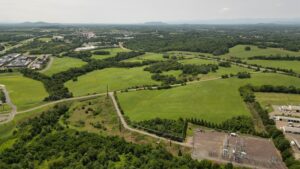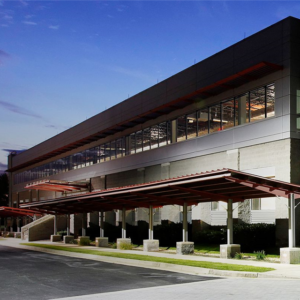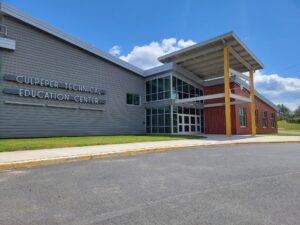
This blog is one in a series of articles spotlighting Culpeper’s creation of the Culpeper Tech Zone (CTZ). The CTZ is a 950-acre campus designated to host data centers, public works entities, and educational institutions supporting the county’s STEM initiatives. You can read all of the CTZ stories here.
Location is paramount for any business, but is an essential consideration for data center enterprises. While companies have abundant land options across the United States, IT infrastructures have a specialized list of determinants to consider when searching for a location — including access to fiber connectivity, electrical power, natural environment, financial considerations, and more.

As primary markets in Northern Virginia, Silicon Valley, Dallas, Chicago, Los Angeles, and beyond become overcrowded, land and price constraints for large data center campus developments have forced companies to look for areas of opportunity elsewhere.
As Culpeper County’s primary space dedicated to housing data centers, the Culpeper Tech Zone (CTZ) offers these businesses an advantageous opportunity for expansion through its proximity to existing markets, access to critical infrastructure, existing pool of skilled workers, and welcoming business community. Five developers are planning data centers in the CTZ: Cielo Digital Infrastructure; CloudHQ; Copper Ridge; DataBank; and Peterson Companies.
Brett Burnette, director of development for CloudHQ, shares, “Our tenants are some of the largest cloud service providers out there. We heard that the Culpeper area would be a great future expansion opportunity and our tenants wanted the benefits of available and affordable land near the well-established data center markets in Richmond and Northern Virginia.”
“It was a good move for us to get space in a market where our tenants want to expand, and for us to work with a jurisdiction that supports data centers.” – Brett Burnette, director of development for CloudHQ.
Located an hour and a half outside Washington, D.C., the CTZ provides available and affordable land for nearby government applications and data storage.
“Culpeper has a history of connectivity, dating back to its time as the Federal Reserve’s emergency location,” adds Christopher J. Maier, senior vice president of implementation for Cielo Digital Infrastructure. “The area is a strategic location for data centers since it is outside the electrical transmission constraints faced by greater Loudoun County.”

Critical Infrastructure
When selecting a property for new construction, data centers must evaluate whether a site can harness the robust energy required to operate its expansive number of servers and cooling systems. Culpeper County officials paid special attention to this need when limiting the area for the CTZ. By design, they chose the CTZ’s location to capitalize on the region’s existing infrastructure.
Adam Cook, managing director of development for Peterson Companies, said, “When we first started looking at [the CTZ], it was really the frontier. We believed that due to the finite availability of both power and land in Loudoun and Prince William counties, data center groups would have to look beyond those boundaries. Culpeper had the components that we were looking for — land, fiber, power, and water — all together. So that was what allowed us to make the decision to purchase there.”
Burnette adds, “There are two existing data centers within the zone already. That brings with it existing fiber networks that are important for our operation. We worked with local power providers, zoning and planning commissions, and Culpeper County Economic Development (CCED) to do our due diligence. We understood the story of what infrastructure was already in place and what required planning was needed to get power to the site.”
Knowing that data centers could build on this solid electrical foundation, the Culpeper County Board of Supervisors anticipated they could limit major trailblazing of power and fiber lines for new development — avoiding unnecessary construction outside of the CTZ.
Culpeper’s Skilled Workforce
During development, the companies will require construction, carpentry, and other skilled trades to build the highly advanced buildings. Once operational, the buildings will require approximately 100 to 150 in-house employees, along with experienced workers in ancillary industries such as HVAC, electrical, building maintenance, and more.
Devin Kakar, assistant development manager for CloudHQ, shares, “A lot of people do not realize that these warehouse-looking structures are truly engineering masterpieces from a mechanical and electrical standpoint.” He adds, “These servers emit heat that requires significant cooling mechanisms and studies the airflow and ambient temperatures that need to be maintained for the equipment to maintain peak functionality. It’s truly stunning how masterful these buildings are.”
Renowned for its proficiency in STEM fields, Culpeper County provides incoming businesses with a highly skilled workforce of IT professionals and tradespeople. With a runway to operation laid out, companies can plan for any additional training needed for personnel well before opening.
“From the time we know a project is going to start to when it is complete is about two years,” shares Burnette. “So, the goal would be to train local employees to start working there on day one. Within that time, we do our best to pull from the local workforce and train them as needed. We’re lucky with Culpeper because we already know the workforce there is knowledgeable in these kinds of careers.”
Community Impact
The CCED has taken notable steps to facilitate a smooth process for businesses entering the CTZ.
“The speed at which we can move from concept to launch in Culpeper is truly remarkable,” Cook notes. “This agility is crucial when working with technology, which evolves daily. We need a partner who can swiftly conceptualize and implement solutions. What might take 24 to 36 months in more established data center markets, we can accomplish in a fraction of that time in Culpeper.”
Burnette adds, “It’s great that Culpeper identified this tech corridor as a location that would benefit data centers. We need to make sure our businesses go in the right places and that residents are happy with data centers being in the community and us being neighbors.”
“The CCED and Bryan Rothamel have been valuable partners for us while we worked to land DataBank’s next data center in the CTZ, a perfect location for DataBank’s 85-acre campus that will accommodate up to 1.4 million square feet and 192 megawatts of critical IT load. For such an important addition to our Virginia footprint, the CCED’s support has been key to making smooth progress, definitely a model for other markets.” – Justin Puccio, executive vice president of corporate strategy for DataBank.
When enacting the CTZ, Culpeper had a distinct understanding that, while the county has a myriad of benefits for the data center companies, the data centers, in turn, will have far-reaching positive impacts on the community.
Bryan Rothamel, CEcD, and director of the CCED says, “We have something unique here in Culpeper. By encouraging the data centers to come here, in a way that we thought to be valuable and moderated, we’re charting the path for long-term community partnerships that will produce significant gains far outside its borders for years to come.”
As the sites for the data centers are in various stages of planning and development, the CCED is working with the businesses to help them establish themselves as community partners. Through conversations with residents and community leaders, the data centers are beginning to understand how they can support Culpeper through education programs, sponsorships, and other initiatives that align with local needs.
“We want to work with the county and Bryan to understand residents’ priorities — what they want to see Culpeper do and how they want to see it grow. We’re excited to be a part of that,” finishes Burnette.


